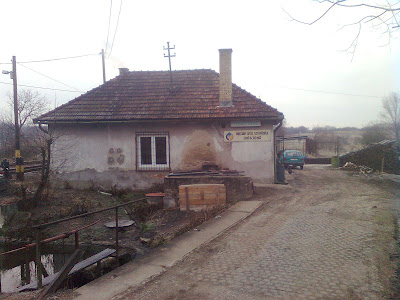In rural Hungary it's common to make a strong brandy called pálinka out of the season's fruit, usually from the bounty of plums, apricots, pears, cherries and apples that the countryside produces every year. You can make it out of any fruit, really, except maybe a tomato, but those are the most common ones. There is also a grappa made from leftover crushed wine grapes, which is sort of a separate sub-category. Pálinka is similar to schnapps (which is usually a bit milder) and (more so) to the rakia and slivovice they make across the Balkans. Fruit here in a good season has a distinctive succulence, which gets passed on in the distillation. Quality ranges from untaxed and undrinkable (unless you want a monster headache) moonshine made in home stills to artisanal commercial varieties that can be as complex and expensive as high-end whiskies or brandies.
 |
| a hardworking apple tree |
And this is what we are doing this December morning. This will foreseeably be Tamás's last batch ever, since the aging trees are on their last legs and he's ready to retire as a pálinka hobbyist anyway. It's quite a bit of work, especially for someone who doesn't drink much of it himself. I had helped with processing the fruit on a couple occasions over the last two years - and gone on a couple plum raids around the neighborhood, since fallen fruit (or nearly-fallen) fruit by the roadside outside fenced areas (there's a lot of it all over in season) is considered fair game. Once we wandered onto some unmarked private property and got into a standoff with a troop of local peasants, until we convinced them that it wasn't their pumpkins we were after. They didn't care about the plums. In fairness, crop theft is a major problem in rural areas and, among other unfortunate effects, greatly contributes to tensions between gypsies and non-gypsies in such places. But fallen plums don't count.
Anyway, Tamás had long ago promised that when the final batch was ready go, he would take me to the distillery to watch. Most larger villages have such a facility, usually close to the railroad tracks, like this one, since the trains don't complain about the smell. You pay the professional distiller to cook up your mash to a specified strength of alcohol. Of course, he has a meter on his machine and you have to pay the excise taxes (the revenuers are very strict about this and check for undocumented booze regularly) in addition to the distillery fee, so it's not the cheapest way to get juiced, but he knows what he's doing and you get what you pay for in terms of quality. This is in contrast to home distilling, which, seemingly the most pressing issue facing the government for several months last year, has been recently legalized in small quantities (they were doing it anyway, in small quantities or otherwise, and selling much of it illicitly to the hard up), where, as István the distiller put it, "they don't know where it starts and ends and can't reach anything like our level of quality" - referring to the heads and tails, the beginning and end of the distillation process that you have to throw out because they are full of nasty headache chemicals, among other flaws. I don't think the moonshiners are too selective about the quality of the fruit they throw in the barrel either. Don't drink it!
 |
| mash |
And then this pot still
sends the vapors from the mash through the pipes overhead over to one of these electric blue things which I think in English are called a column still, which is much more clever than the pot still and much less picturesque.
Then you can leave the column still to do its job and go for a coffee and a wander around the wonders of Nográd county, which I will cover in some later post. And when you come back, out is pouring the Pálinka. 39 litres of it!
István's little alcohol-content-measuring device said it was 47%, which is just right. It can come out much stronger, in which case you add distilled water to get it to the correct strength.
The pálinka goes into giant demijohns. It has to sit for a few months before the flavors marry. Right now it would just taste like something out of a chem lab. To some of it Tamás will add dried plums and apricots, and let it sit even longer, which gives a sweeter, richer taste.
Now I need to get my own tree!






